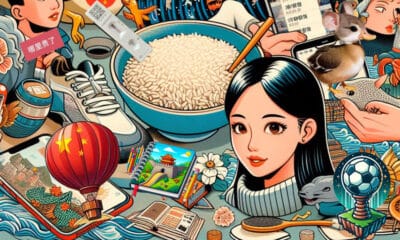China Memes & Viral
Kidnappers? Crazy Fans? No, It’s Chinese Parents on Their Kids’ First Day at School
The first day of school is often a major milestone – perhaps more so for parents than for their children. These Chinese parents could not resist the urge to spy on their kids during that first schoolday, which started this week.
Published
7 years agoon
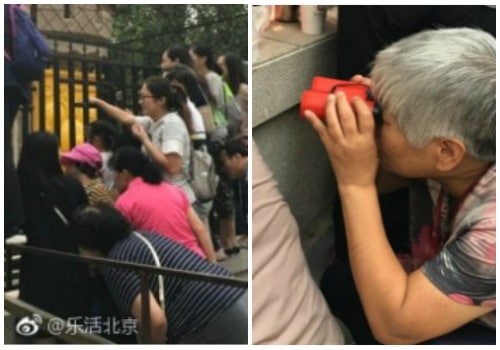
The first day of school is often a major milestone – perhaps more so for parents than for their children. These Chinese parents could not resist the urge to spy on their kids during that first schoolday, which started this week.
“If you spot these kinds of people near a preschool today, there’s no need to worry about them. They’re not bad people, they’re no kidnappers, it’s just that their child has their first day of school,” one Chinese blogger wrote on Weibo this week, as many netizens shared dozens of snapshots of parents doing everything they can to catch a glimpse of their child from outside the classroom.
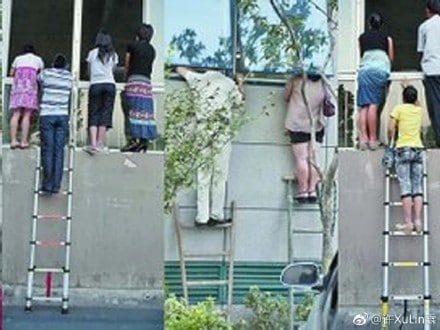
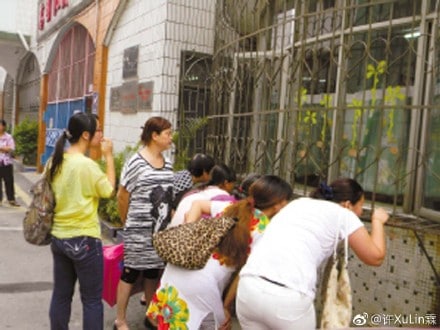
“Yes! This is exactly how it goes on that first day,” another popular Weibo blogger said.
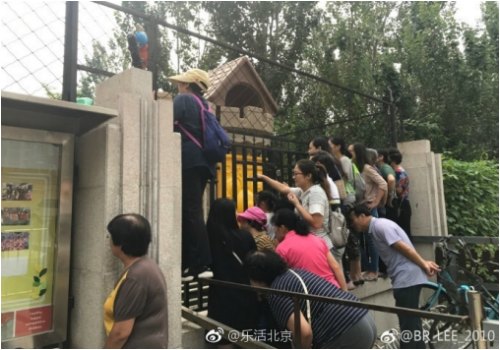
The ‘no kidnappers’ Weibo post was shared over 33,000 times this week, triggering thousands of reactions from netizens both ridiculing the parents and sympathizing with them, as their separation anxiety is often worse than that of their children.

“My niece first went to kindergarten this week,” one commenter shares: “and as the child next to her was crying she stayed cool and collected and comforted her, saying ‘don’t cry, it’s no use crying over this’.”
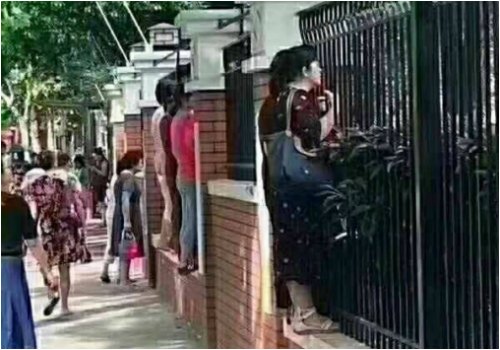
There are also people who mention that it is not easy for teachers when parents stand outside while their children are inside, as teachers had to come forward to say they wish the parents would leave. Once the children are finally settled down, they will start crying again upon catching a sight of their parents.

The phenomenon of Chinese parents who cannot say goodbye to their schoolgoing children does not just occur outside kindergartens. Last year, the so-called ‘tents of love’ (爱心帐篷) became a hot topic on Chinese social media.
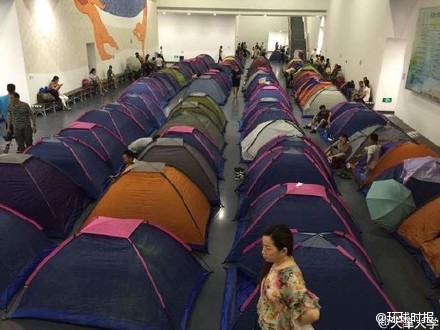
“Tents of love”: parents set up their tents at university campus to support their children.
When students have their first day at college, parents who come from far will often travel along with their children and spent the first days sleeping in tents outside the school. They do this to give their children both emotional and practical support, but perhaps more so to soothe their own separation anxiety.

Both the ‘tents of love’ and the clingy parents outside kindergartens are seen as a modern-day phenomenon by many Chinese web users. Today’s generations of children are nowhere near as independent as the older generations were, many say.
“I went to preschool alone, and I even paid the school tuition myself with the money in my backpack,” one commenter notes.

“We were poor when I was growing up – I never even went to kindergarten,” says one of the many responders to the pictures on Weibo.

But people mostly think the photos of the clingy parents are humorous: “Just look at their posture – they want to see, but they do not want to be seen,” a person says, adding a smiley.
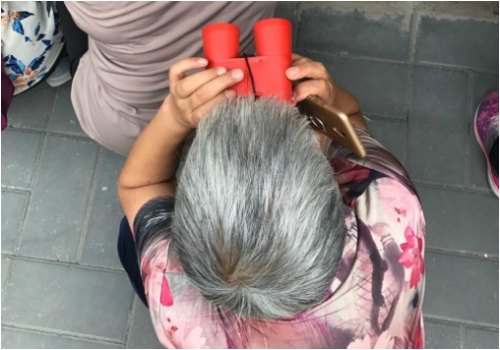
“What a mysterious spectacle it is!”, others say, as if it were photos from a nature documentary.
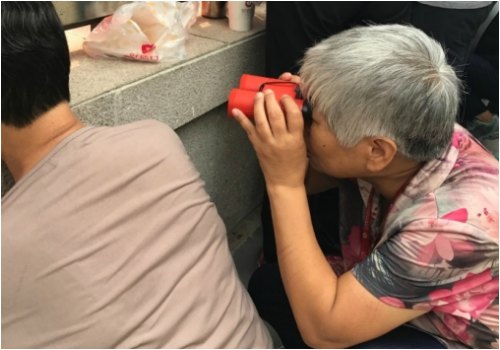
Many just think the scenes are touching: “These parents and grandparents just have so much love!”
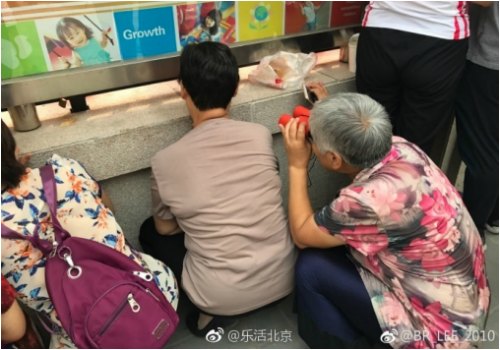

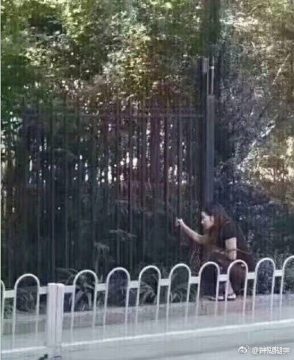
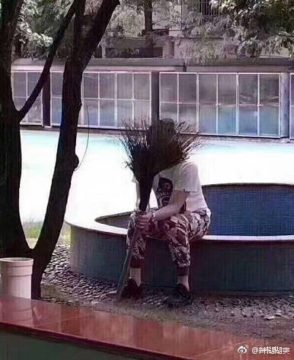
Will he go unnoticed?
By Manya Koetse & Miranda Barnes
Follow @whatsonweibo
©2017 Whatsonweibo. All rights reserved. Do not reproduce our content without permission – you can contact us at info@whatsonweibo.com.
Manya is the founder and editor-in-chief of What's on Weibo, offering independent analysis of social trends, online media, and digital culture in China for over a decade. Subscribe to gain access to content, including the Weibo Watch newsletter, which provides deeper insights into the China trends that matter. More about Manya at manyakoetse.com or follow on X.

You may like
China Digital
“Dear Li Hua”: The TikTok/Xiaohongshu Honeymoon Explained
As American ‘TikTok Refugees’ flock to China’s Xiaohongshu (Rednote), their encounter with ‘Li Hua’ strikes a chord in divided times.
Published
23 hours agoon
January 20, 2025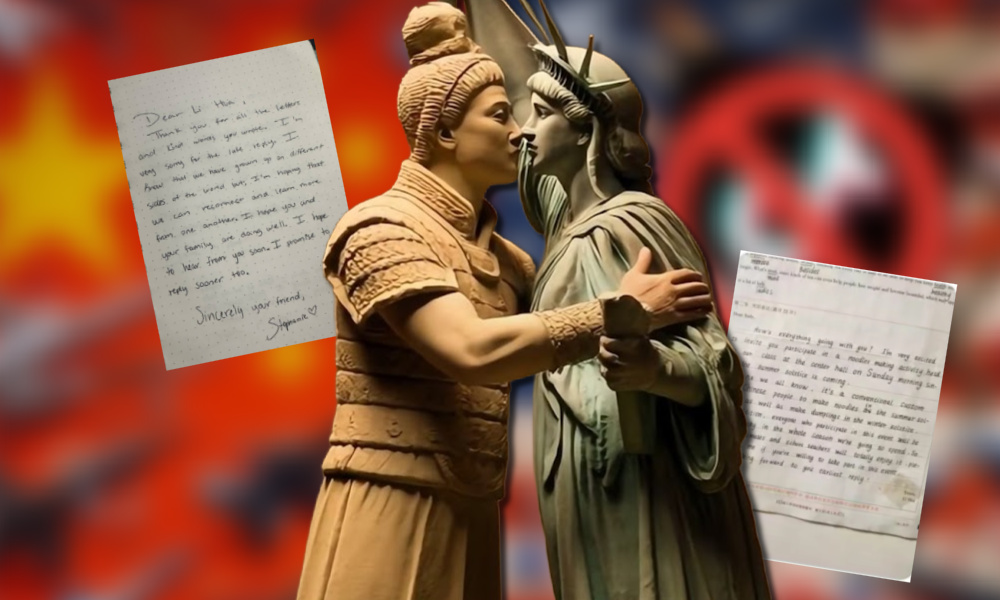
FROM THE WEIBO WATCH PREMIUM NEWSLETTER
China’s Xiaohongshu (Rednote) has seen an unprecedented influx of foreign “TikTok refugees” over the past week, giving rise to endless jokes. But behind this unexpected online migration lie some deeper themes—geopolitical tensions, a desire for cultural exchange, and the unexpected role of the fictional character Li Hua in bridging the divide.
Imagine you are Li Hua (李华), a Chinese senior high school student. You have a foreign friend, far away, in America. His name is John, and he has asked you for some insight into Chinese Spring Festival, for an upcoming essay has to write for the school newspaper. You need to write a reply to John, in which you explain more about the history of China’s New Year festival and the traditions surrounding its celebrations.
This is the kind of writing assignment many Chinese students have once encountered during their English writing exams in school during the Gaokao (高考), China’s National College Entrance Exams. The figure of ‘Li Hua’ has popped up on and off during these exams since at least 1995, when Li invited foreign friend ‘Peter’ to a picnic at Renmin Park.
Over the years, Li Hua has become somewhat of a cultural icon. A few months ago, Shangguan News (上观新闻) humorously speculated about his age, estimating that, since one exam mentioned his birth year as 1977, he should now be 47 years old—still a high school student, still helping foreign friends, and still introducing them to life in China.
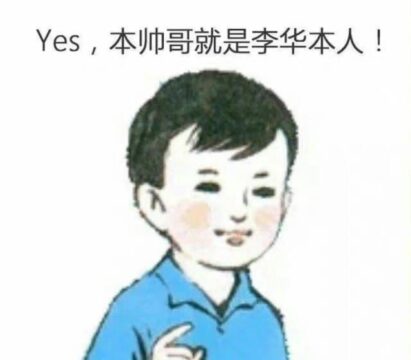
Li Hua: the connector, the helper, the icon.
This week, however, Li Hua unexpectedly became a trending topic on social media—in a week that was already full of surprises.
With a TikTok ban looming in the US (delayed after briefly taking effect on Sunday), millions of American TikTok users began migrating to other platforms this month. The most notable one was the Chinese social media app Xiaohongshu (now also known as Rednote), which saw a massive influx of so-called “TikTok refugees” (Tiktok难民). The surge propelled Xiaohongshu to the #1 spot in app stores across the US and beyond.
This influx of some three million foreigners marked an unprecedented moment for a domestic Chinese app, and Xiaohongshu’s sudden international popularity has brought both challenges and beautiful moments. Beyond the geopolitical tension between the US and China, Chinese and American internet users spontaneously found common ground, creating unique connections and finding new friends.
While the TikTok/Xiaohongshu “honeymoon” may seem like just a humorous trend, it also reflects deeper, more complex themes.
✳️ National Security Threat or Anti-Chinese Witchhunt?
At its core, the “TikTok refugee” trend has sprung from geopolitical tensions, rivalry, and mutual distrust between the US and China.
TikTok is a wildly popular AI-powered short video app by Chinese company ByteDance, which also runs Douyin, the Chinese counterpart of the international TikTok app. TikTok has over 170 million users in the US alone.
A potential TikTok ban was first proposed in 2020, amid escalating US-China tensions. President Trump initiated the move, citing security and data concerns. In 2024, the debate resurfaced in global headlines when President Biden signed the “Protecting Americans from Foreign Adversary Controlled Applications Act,” giving ByteDance nine months to divest TikTok or face a US ban.
TikTok, however, has continuously insisted it is apolitical, does not accept political promotion, and has no political agenda. Its Singaporean CEO Shou Zi Chew maintains that ByteDance is a private business and “not an agent of China or any other country.”
🇺🇸 From Washington’s perspective, TikTok is viewed as a national and personal security threat. Officials fear the app could be used to spread propaganda or misinformation on behalf of the Chinese Communist Party.
🇨🇳 Beijing, meanwhile, criticizes the ban as an act of “bullying,” accusing the US of protectionism and attempting to undermine China’s most successful internet companies. They argue that the ban reflects America’s inability to compete with the success of Chinese digital products, labeling the scrutiny around TikTok as a “witch hunt.”
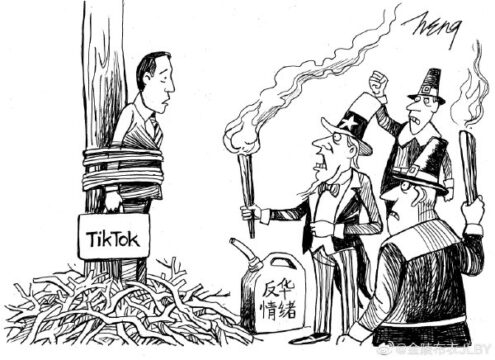
Political cartoon about the American “witchhunt” against TikTok, shared on Weibo in 2023, also published on Twitter by Lianhe Zaobao.
“This will eventually backfire on the US itself,” China’s Foreign Ministry spokesperson Wang Wenbin predicted in 2024.
Wang turned out to be quite right, in a way.
When it became clear in mid-January that the ban was likely to become a reality, American TikTok users grew increasingly frustrated and angry with their government. For many of these TikTok creators, the platform is not just a form of entertainment—it has become an essential part of their income. Some directly monetize their content through TikTok, while others use it to promote services or products, targeting audiences that other platforms like Facebook, Instagram, or X can no longer reach as effectively.
Initially, the mass migration of American users to Xiaohongshu was a symbolic protest against US policies. Users advocated for the right to choose their preferred social media, and voiced their frustration at how their favorite app had become a pawn in US-China geopolitical tensions. Rejecting the narrative that “data must be protected from the Chinese,” many pointed out that privacy concerns were equally valid for US-based platforms. As an act of playful political defiance, these users downloaded Xiaohongshu to demonstrate they didn’t fear the government’s warnings about Chinese data collection.
(If they had the option, by the way, they would have installed Douyin—the actual Chinese version of TikTok—but it is only available in Chinese app stores, whereas Xiaohongshu is accessible in international stores, so it was picked as ‘China’s version of TikTok.’)
Xiaohongshu is actually not the same as TikTok at all. Founded in 2013, Xiaohongshu (literal translation: Little Red Book) is a popular app with over 300 million users that combines lifestyle, travel, fashion, and cosmetics with e-commerce, user-generated content, and product reviews. Like TikTok, it offers personalized content recommendations and scrolling videos, but is otherwise different in types of engagement and being more text-based.
As a Chinese app primarily designed for a domestic audience, the sudden wave of foreign users caused significant disruption. Xiaohongshu must adhere to the guidelines of China’s Cyberspace Administration, which requires tight control over information flows. The unexpected influx of foreign users undoubtedly created challenges for the company, not only prompting them to implement translation tools but also recruiting English-speaking content moderators to manage the new streams of content. Foreigners addressing sensitive political issues soon found their accounts banned.
Of course, there is undeniable irony in Americans protesting government control by flocking to a Chinese app functioning within an internet system that is highly controlled by the government—a move that sparked quite some debate and criticism as well.
✳️ The Sino-American ‘Dear Li Hua’ Moment
While the initial hype around Xiaohongshu among TikTok users was political, the trend quickly shifted into a moment of cultural exchange. As American creators introduced themselves on the platform, Chinese users gave them a warm welcome, eager to practice their English and teach these foreign newcomers how to navigate the app.
Soon, discussions about language, culture, and societal differences between China and the US began to flourish. Before long, “TikTok refugees” and “Xiaohongshu natives” were collaborating on homework assignments, swapping recipes, and bonding through humor.
For instance, Chinese users jokingly asked the “TikTok refugees” to pay a “cat tax” for seeking refuge on their platform, which American users happily fulfilled by posting adorable cat photos. American users, in turn, joked about becoming best friends with their “Chinese spies,” playfully mocking their own government’s fears about Chinese data collection.

The newfound camaraderie sparked creativity, as users began generating humorous images celebrating the bond between American and Chinese netizens—like Ronald McDonald cooking with the Monkey King or the Terra Cotta Soldier embracing the Statue of Liberty. Later, some images even depicted the pair welcoming their first “baby.”

🇺🇸 At the same time, it became clear just how little Americans and Chinese truly know about each other. Many American users expressed surprise at the China they discovered through Xiaohongshu, which contrasted sharply with negative portrayals they’ve seen in the media. While some popular US narratives often paint Chinese citizens as “brainwashed” by their government, many TikTok users began to reflect on how their own perspectives had been shaped—or even “manipulated”—by their media and government.
🇨🇳 For Chinese users, the sudden interaction underscored their digital isolation. Over the past 15 years, China has developed its own tightly regulated digital ecosystem, with Western platforms like Facebook, Twitter, Instagram, and YouTube inaccessible in the mainland. While this system offers political and economic advantages, it has left many young Chinese people culturally hungry for direct interaction with foreigners—especially after years of reduced exchange caused by the pandemic, trade tensions, and bilateral estrangement. (Today, only some 1,100 American students are reportedly studying in China.)
The enthusiasm and eagerness displayed by American and Chinese Xiaohongshu users this week actually underscores the vacuum in cultural exchange between the two nations.
As a result of the Xiaohongshu migration, language-learning platform Duolingo reported a 216% rise in new US users learning Mandarin—a clear sign of growing interest in bridging the US-China divide.
Mourning the lack of intercultural communication and celebrating this unexpected moment of connection, Xiaohongshu users began jokingly asking Americans if they had ever received their “Li Hua letters.”
What started as some lighthearted remarks evolved into something much bigger as Chinese users dug up their old Gaokao exam papers and shared the letters they had written to their imaginary foreign friends years ago. These letters, often carefully stored in drawers or organizers, were posted with captions like, “Why didn’t you reply?” suggesting that Chinese students had been trying to reach out for years.
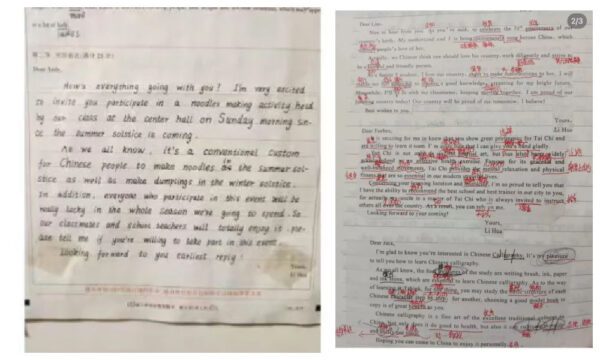
Example letters on Xiaohongshu: ‘Li Hua’ writing to foreign friends.
The story of ‘Li Hua’ and the replies he never received struck a chord with American Tiktok users. One user, Debrah.71, commented:
“It was the opposite for us in the USA. When I was in grade school, we did the same thing—we had foreign pen pals. But they did respond to our letters.”
Then, something extraordinary happened: Americans started replying to Li Hua.
One user, Douglas (@neonhotel), posted a heartfelt video of him writing a letter to Li Hua:
📝”Dear Li Hua, I’m sorry I didn’t get your letters. I understand you’ve been writing me for a long time, but now I’m here to reply. Hello, from your American friend. I hope you’re well. Life here is pretty normal—we go to work, hit the gym, eat dinner, watch TV. What about you? Please write back. I’m sorry I didn’t reply before, but I’m here now. Your friend, Douglas.”
Another user, Tess (@TessSaidThat), wrote:
📝”Dear Li Hua, I hope this letter finds you well. I’m so sorry my response is so late. My government never delivered your letters. Instead, they told me you didn’t want to be my friend. Now I know the truth, and I can’t wait to visit. Which city should I visit first? With love, Tess.”
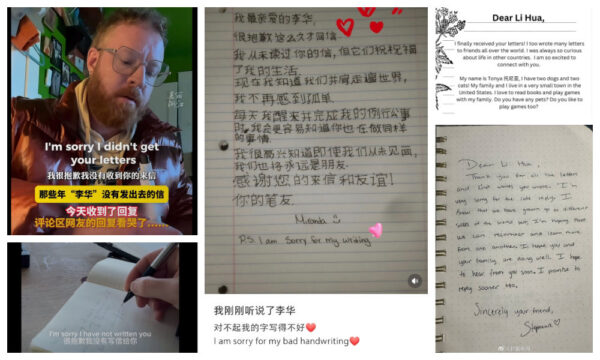
Examples of Dear Li Hua letters.
Other replies echoed similar sentiments:
📝”Dear Li Hua, I’m sorry the world kept us apart.”
📝”I know we don’t speak the same language, but I understand you clearly. Your warmth and genuine kindness transcend every barrier.”
📝”Did you achieve your dreams? Are you still practicing English? We’re older now, but wherever we are, happiness is what matters most.”
These exchanges left hundreds of users—both Chinese and American, young and old, male and female—teary-eyed. In a way, it’s the emotional weight of the distance—represented by millions of unanswered letters—that resonated deeply with both “TikTok refugees” and “Xiaohongshu natives.”
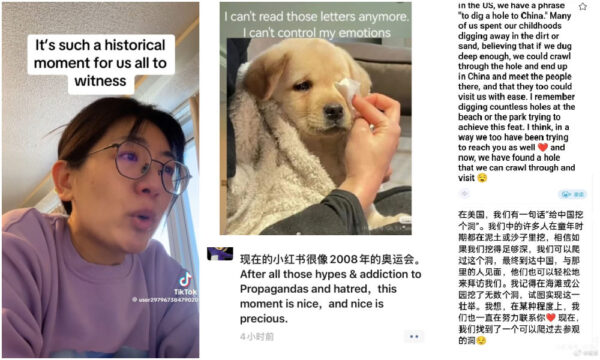
Emotional responses to the Li Hua letters.
The letters seemed to symbolize the gap that has long separated Chinese and American people, and the replies highlighted the unusual circumstances that brought these two online communities together. This moment of genuine cultural exchange made many realize how anti-Chinese, anti-American sentiments have dominated narratives for years, fostering misunderstandings.
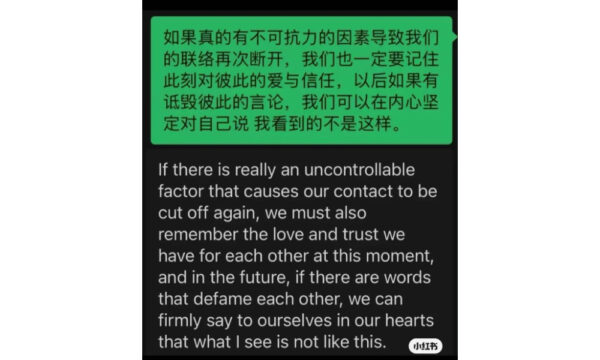
Xiaohongshu commenter.
On the Chinese side, many people expressed how emotional it was to see Li Hua’s letters finally receiving replies. Writing these letters had been a collective experience for generations of Chinese students, creating messages to imaginary foreign friends they never expected to meet.
Receiving a reply wasn’t just about connection; it was about being truly seen at a time when Chinese people often feel underrepresented or mischaracterized in global contexts. Some users even called the replies to the Li Hua letters a “historical moment.”
✳️ Unity in a Time of Digital Divide
Alongside its political and cultural dimensions, the TikTok/Xiaohongshu “honeymoon” also reveals much about China and its digital environment. The fact that TikTok, a product of a Chinese company, has had such a profound impact on the American online landscape—and that American users are now flocking to another Chinese app—showcases the strength of Chinese digital products and the growing “de-westernization” of social media.
Of course, in Chinese official media discourse, this aspect of the story has been positively highlighted. Chinese state media portrays the migration of US TikTok users to Xiaohongshu as a victory for China: not only does it emphasize China’s role as a digital superpower and supposed geopolitical “connector” amidst US-China tensions, but it also serves as a way of mocking US authorities for the “witch hunt” against TikTok, suggesting that their actions have ultimately backfired—a win-win for China.
The Chinese Communist Party’s Publicity Department even made a tongue-in-cheek remark about Xiaohongshu’s sudden popularity among foreign users. The Weibo account of the propaganda app Study Xi, Strong Country, dedicated to promote Party history and Xi Jinping’s work, playfully suggested that if Americans are using a Chinese social media app today, they might be studying Xi Jinping Thought tomorrow, writing: “We warmly invite all friends, foreign and Chinese, new and old, to download the ‘Big Red Book’ app so we can study and make progress together!”
Perhaps the most positive takeaway from the TikTok/Xiaohongshu trend—regardless of how many American users remain on the app now that the TikTok ban has been delayed—is that it demonstrates the power of digital platforms to create new, transnational communities. It’s unfortunate that censorship, a TikTok ban, and the fragmentation of global social media triggered this moment, but it has opened a rare opportunity to build bridges across countries and platforms.
The “Dear Li Hua” letters are not just personal exchanges; they are part of a larger movement where digital tools are reshaping how people form relationships and challenge preconceived notions of others outside geopolitical contexts. Most importantly, it has shown Chinese and American social media users how confined they’ve been to their own bubbles, isolated on their own islands. An AI-powered social media app in the digital era became the unexpected medium for them to share kind words, have a laugh, exchange letters, and see each other for what they truly are: just humans.
As millions of Americans flock back to TikTok today, things will not be the same as before. They now know they have a friend in China called Li Hua.
By Manya Koetse
(follow on X, LinkedIn, or Instagram)
Spotted a mistake or want to add something? Please let us know in comments below or email us. First-time commenters, please be patient – we will have to manually approve your comment before it appears.
©2025 Whatsonweibo. All rights reserved. Do not reproduce our content without permission – you can contact us at info@whatsonweibo.com.
China Memes & Viral
Our Picks: Top 10 Chinese Buzzwords and Phrases of 2024 Explained
From quirky potatoes to low-key vibes, we uncover 10 buzzwords that shaped China’s cultural and social landscape in 2024.
Published
3 weeks agoon
December 31, 2024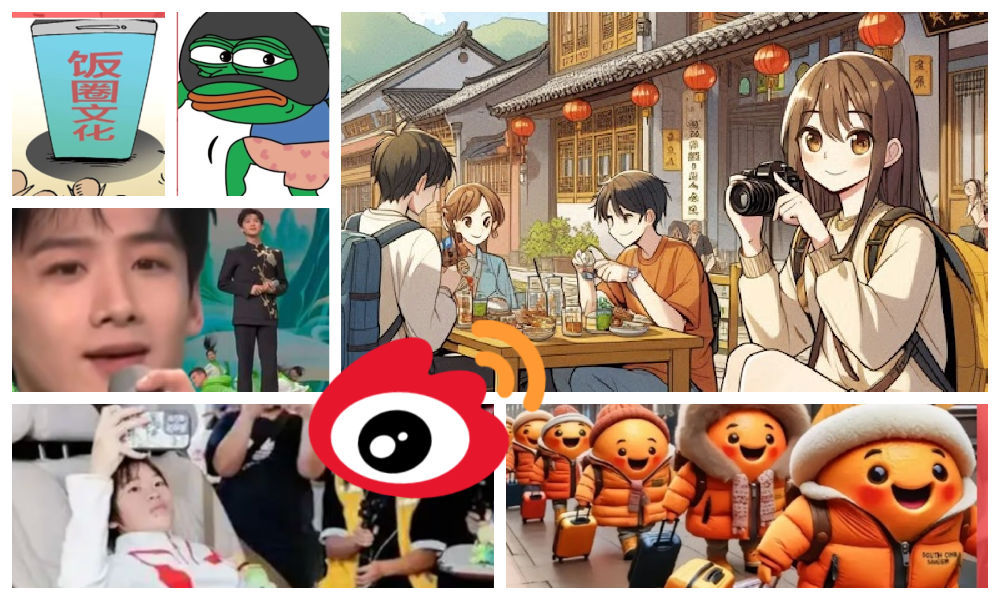
From ‘Chillax’ to ‘Digital Ibuprofen,’ this compilation of ten Chinese buzzwords and catchphrases by What’s on Weibo reflects social trends and the changing times in China in 2024.
At the end of each year, Chinese media outlets compile lists of the most impactful buzzwords that shaped public discourse. The most popular new words and expressions are generally listed by the Chinese linguistics magazine Yǎowén Jiáozì (咬文嚼字), which selects ten noteworthy buzzwords (十大流行语).
If you want to know more about the buzzwords that made it to Chinese official media’s lists this year, check out this post by Andrew Methven at RealTime Mandarin which is a top ten compilation of Chinese buzzwords of 2024 based on these lists.
Here, we’ve curated a different list: a special What’s on Weibo top 10 of buzzwords and catchphrases from 2024. Each term reflects a broader trend, which we’ll explore in this article. Many of these words were previously featured in our premium Weibo Watch newsletter, where we highlight a word of the week in every issue. (Subscribe to get our newsletter).
These words are not in order of popularity, but rather in order of appearance throughout the year.
#1: SOUTHERN LITTLE POTATOES
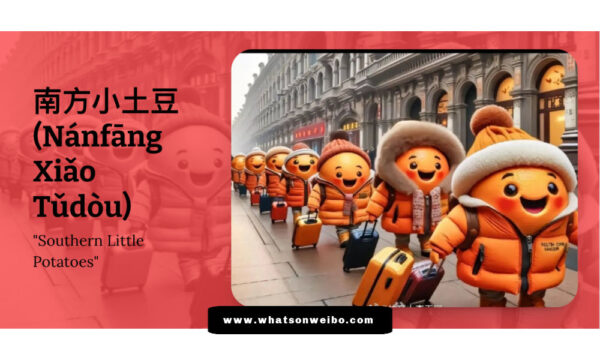
Nánfāng xiǎo tǔdòu (南方小土豆)
The term “Southern Little Potatoes” (南方小土豆) became all the rage in early 2024 in the context of the travel hype surrounding Harbin, which saw a huge influx of tourists from the warmer southern regions who came to the snow-blanketed city or other destinations in the Three Northeastern Provinces (东北三省: Heilongjiang, Jilin, and Liaoning).
The southern tourists were soon nicknamed “Southern Little Potatoes.” While visiting China’s cold northeast, they tend to stand out due to their smaller stature, light-colored down jackets, and brand-new winter hats. Their appearance not only contrasts with that of the typically taller and darker-dressed locals, but some people also think it makes them look like “little potatoes.” After the endearing term “Southern Little Potato” became popular due to a viral video, some southern tourists, especially women, also adopted this term to humorously describe themselves.

Very soon after it caught on, locals started using “Southern Little Potatoes” as a humorous marketing strategy to attract more southern visitors. Harbin street vendors began selling plush keychains of “Southern Little Potatoes,” and even local taxis invited the “baby potatoes” to get on board (“土豆宝宝请上车”).
Through jokes, memes, and media stories about these “potatoes,” a narrative came to life about the city of Harbin taking care of and pampering these “naive,” “little” visitors. Although the term is meant to be affectionate, some took offense, suggesting that since it predominantly refers to smaller women, it is actually sexist and reinforces stereotypical perceptions of southern Chinese women. While some critical bloggers argue that the term is harmful and derogatory, the majority of netizens continue to use it for light-hearted banter about the enthusiasm of southern visitors and the hospitality of the northerners welcoming them.
#2: SPRING MOUNTAIN STUDIES

Chūn Shān Xué (春山学)
“Spring Mountain Studies,” or “Chunshan Studies” (春山学), became a viral phenomenon on the Chinese internet following the CMG Spring Festival Gala earlier this year. It was the buzz of the show, capturing widespread attention and sparking heated debates. The phrase “Chunshan Studies” arose from the controversy surrounding the performance by Bai Jingting (白敬亭), Wei Chen (魏晨), and Wei Daxun (魏大勋).
Popular actor and singer Bai Jingting, alongside co-performers Wei Chen and Wei Daxun, performed the song “Going Up Spring Mountain” (上春山). While the song itself wasn’t particularly remarkable at first glance, it quickly became the center of attention due to the staging arrangement: the three singers were positioned on a tiered platform representing a mountain, with Bai standing on the highest pedestal.

Controversy arose when Bai remained on the top pedestal after his part, seemingly blocking Wei Daxun from taking the higher position. As a result, Wei performed from a lower step, creating choreographic asymmetry and apparent confusion on stage. Speculation grew that Bai may have intentionally stayed in the prominent position to draw more attention.
Adding to the rumors was Bai’s choice of attire—he wore all black, while Wei Chen and Wei Daxun were dressed in white. Netizens suggested this made him stand out even more. Rehearsal footage posted online fueled these suspicions. In one rehearsal video, Bai stepped down after his part as expected and wore white like the others. This led to accusations that he deliberately changed his outfit and position during the live performance to ensure he stayed at the center of attention.
The timing of these changes also raised eyebrows. Since the Spring Festival Gala is a live event, but typically runs a recorded dress rehearsal alongside the live broadcast for contingency purposes, any significant alterations to staging or wardrobe would prevent producers from seamlessly switching to the pre-recorded version. Critics argued that Bai’s supposed changes sabotaged this fallback option, leaving producers unable to correct the perceived imbalance.
The controversy ignited widespread criticism of Bai Jingting, with detractors accusing him of selfishness and poor character. Social media erupted with debates, and the term “Chunshan Studies” was coined humorously to describe the detailed analysis and theories surrounding the incident.
Online communities, particularly on platforms like Douyin and Bilibili, became hubs of “Chunshan Studies,” as netizens scrutinized every detail of the performance. Videos dissecting wardrobe choices, body language, and stage movements frame by frame went viral. What began as speculation about Bai’s intent turned into a pseudo-academic field, blending elements of popular culture analysis, media discourse, and social studies.
Some commentators argued that the discussion reflected deeper issues about equity and ethical behavior in the entertainment industry, elevating the controversy beyond a simple song performance. Who would have thought that a single performance of “Going Up Spring Mountain” could spark such an intellectual and cultural phenomenon?
#3: MELLOW PEOPLE

Dàn rén (淡人)
“Mellow People” (淡人) is a term that emerged in 2024 to describe the mental state of young people in China today. The word dàn 淡, which I’ve translated as ‘mellow’ in this context, carries a range of meanings in Chinese: it can imply lightness, calmness, indifference, paleness, or even triviality.
To be a dàn individual, a dànrén 淡人, has become a way for young people to express how they navigate life. They might want to quit their uninspiring job, but it pays the bills—so it’s okay. They endure hours of commuting every day because the rent is cheaper—so it’s okay. They’re pushed into blind dates by their parents, even though they’d rather not go, but they lack the energy to resist—so it’s okay.
Being ‘mellow’ or ‘unperturbed’ means remaining indifferent in a calm, lighthearted way. Similar to earlier Chinese popular expressions like “lying flat” (躺平) or being “Buddha-like” (佛系), it’s a way of coping with the pressures and challenges of modern life. However, it’s slightly more optimistic than outright passivity (like lying flat): it reflects a passive acceptance of life as it is, embracing the monotony of daily routines and competitive work environments without resistance.
The concept of being a dànrén has even developed into its own pseudo-discipline, referred to as 淡人学 dànrén xué, which might be translated as ‘Mellowism’ or, perhaps more aptly, ‘Unperturbabilism.’
#4: “BACK TO THE ROOT”

Dāngguī (当归)
The term dāngguī 当归, freely translated as “back to the root,” came up this year in the context of the propaganda campaign surrounding reunification with Taiwan. Since earlier in 2024, dāngguī is used by Chinese state media in the slogan “Táiwān dāngguī” (#台湾当归#), which means “Taiwan must return [to the motherland].” Separately, the two characters in dāngguī 当归 literally mean “should return.”
However, the slogan is a play on words, as the term dāngguī (当归) as a noun actually means Angelica Sinensis, the Chinese Angelica root or ‘female ginseng,’ a medicinal herb commonly used in traditional Chinese medicine, native to China and cultivated in various East Asian countries.
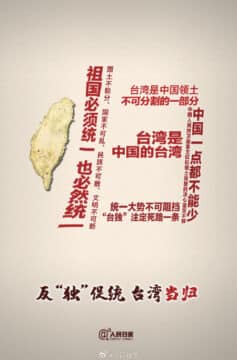
Poster by People’s Daily. ‘Taiwan’ on the left side resembles a piece of ‘female ginseng’.
This play on words is also evident in the poster disseminated by People’s Daily, where Taiwan is depicted on the left and resembles a piece of the yellowish ‘female ginseng’ root. It is part of the character “归” (guī, to return, go back to). The remainder of the character consists of various slogans commonly used by Chinese official media to emphasize that Taiwan is part of China.
Because of this context, where dāngguī 当归 both refers to the discourse of Taiwan returning to China and to the female ginseng root, a creative translation would be “back to the root.” If you want to be less creative, you could also say it’s the Taiwan “should return” campaign.
#5: CHILLAX

Sōngchígǎn (松弛感)
In recent years, the pursuit of a certain “relaxed feeling” has gained popularity across the Chinese internet. Sōngchígǎn is a combination of the word for “relaxed,” “loose” or “lax” (松弛) and the word for “feeling” (感). Initially used to describe a particular female aesthetic, the term evolved to represent a lifestyle where individuals strive to maintain a relaxed demeanor, especially in the face of stressful situations.
The concept gained traction online in mid-2022 when a Weibo user shared a story of a family remaining composed when their travel plans were unexpectedly disrupted due to passport issues. Their calm and collected response inspired the adoption of the “relaxed feeling” term (also read here). Central to embodying this sense of relaxation is being unfazed by others’ opinions and avoiding unnecessary stress or haste out of fear of judgment. Nowadays, Chinese cities aim to foster this sense of sōngchígǎn. Not too long ago, there were many hot topics suggesting that Chengdu is the most sōngchí 松弛, the most relaxed city in China. This sentiment was further reinforced in 2024 when ‘Chengdu Disney’ emerged as a quirky new hotspot (read here).
As for individuals, the most sōngchígǎn person of the year was undoubtedly Olympic athlete Quan Hongchan (全红婵). The young springboard diver from Guangdong became a multi-medalist at the Paris Olympics, going viral for her quirkiness and authenticity. Chinese netizens describe her as “being Guangdong-style relaxed” (“广式”松弛感), not just for her unique sense of style (she loves her “ugly fish slippers”), but for her ability to remain chill while dozens of cameras focus on her.
#6: STRONG STEALTH VIBE

Tōugǎn hěn zhòng (偷感很重)
It’s that moment when you see someone you know and pretend to be busy on your phone to avoid social interaction. Or when someone takes a group picture and you’re unsure how to pose. Or when all eyes are on you and you wish for an invisible cloak.
In 2024, the term “tōugǎn” (偷感) emerged on Chinese social media. Tōugǎn (偷感) literally translates to “stealth sense” or “secret feeling,” but we can interpret it as an overall vibe of being “under-the-radar.” The phrase “tōugǎn hěn zhòng” (偷感很重) means “the stealth sense is strong,” and can be used to describe someone as being “very under-the-radar” or having “a strong stealth vibe.”
The exact origin of this term is unclear, but it likely first appeared on Xiaohongshu in response to a videoclip by the South Korean girl group Le Sserafim for their single “Easy,” where they sing and dance effortlessly with some low-key dance moves.
Tōugǎn (偷感) is used by and resonates with China’s Gen Z to express a common feeling in their daily lives, where they prefer to go about things quietly and low-key, avoiding too much attention. They can still be smooth and effortless, but out of fear of embarrassment or judgment, they do so in a subtle and low-profile manner. They won’t flaunt their achievements, but wait for others to notice them. Unlike earlier internet buzzwords where young people mock themselves, tōugǎn is not negative – it’s a bit tongue-in-cheek and a way for people to connect over their inner worlds that aren’t visible to others.
#7: CITY BU CITY

City不City啊
The phrase ‘City bu City a’ (City不City啊), translated as “City or not?”, took the Chinese internet by storm in the summer of 2024. The phrase became popular thanks to American influencer Paul Mike Ashton, nicknamed “Bao Bao Xiong” (保保熊, Baby Bear), who runs a Chinese-language account on Douyin. On his channel, Ashton shares humorous snippets about his life in China, where he works as an entertainer and tour guide.
In one video from April this year, Ashton posted a clip in which he cycles through the city like a Shanghai ‘city girl’ who often mixes Chinese and English words, calling himself “very city” (“我是好city”). He says: “I’m so city, a city girl. It’s so cool, breezy. Life in the city is so good, I feel so free.” Ashton later began incorporating this phrase more frequently in his humorous videos, sometimes also involving his sister.

Walking on the Shanghai Bund, the brother and sister describe Shanghai as “so city” (“好city啊”). While walking on the Great Wall, Bao Bao asks his sister if it’s “city or not” (it’s not). In other videos in which the two are traveling throug China, Ashton repeatedly asks his younger sister if certain things are “city or not,” to which she usually responds humorously: “It’s very city.” In this context, “city” has evolved from a noun into a quirky adjective, describing something that embodies the essence of urban life; something that is ‘city’ is metropolitan, lively, and modern. It’s very tongue-in-cheek and also serves as a playful commentary on how young Chinese people often mix Chinese and English words to sound more sophisticated and trendy.
This phenomenon sparked the ‘city or not’ meme, which even reached the Foreign Ministry this week when spokesperson Mao Ning was asked about it. She responded that she had heard about the new use of the phrase and that it is a positive sign of foreigners enjoying life in China. Chinese authorities and state media have also jumped on this trend to promote tourism. The meme has been imitated and adapted by various local tourism departments. Ashton himself has encouraged foreigners to come and experience Chinese culture (and its very ‘city’ city life), further boosting its popularity. By now, the phrase has become ingrained in China’s digital culture.
#8: FAN CULTURED

Fànquānhuà (饭圈化)
Around the time of the Olympics and the skyrocketing popularity of Chinese table tennis players, the word ‘fan-cultured’ or ‘fandom-ization’ (fànquānhuà 饭圈化) became increasingly popular in 2024. While fànquān 饭圈 literally means “fan circle,” the suffix huà 化 is generally used to indicate a process of transformation or turning into something, similar to the “-ization” suffix in English.
The term fànquānhuà 饭圈化 refers to the recently much-discussed phenomenon where something—often outside the realms of entertainment—receives passionate support from people who begin to form online fan circles around it, changing the dynamics in ways that resemble the relationships between celebrity idols and their fans.
This year, it became clear how Chinese fans started to form extremely strong communities around China’s table tennis stars, defending them as if they were idols. This fan behavior was harshly criticized by Chinese authorities this year, as they see it as toxic fan culture that goes against the Olympic spirit (read more).
However, “fandom-ization” extends beyond sports. For instance, Chinese pandas have similarly strong fan club dynamics. Even inanimate objects can become “fan-cultured.” A notable example is the Little Forklift Truck (小叉车) that played a role in constructing the Huoshenshan emergency specialty field hospital during the early days of the Covid crisis.

The construction process was live-streamed, and millions of viewers found the hardworking little truck so cute and brave that it too became “fan-cultured.”
#9: RUSHING TO COUNTY-LEVEL TOWNS

Bèn xiàn (奔县)
The term “rushing to the county,” bèn xiàn (奔县), surged in Chinese media after the 2024 National Day holiday. This time, the peak travel period saw increased popularity for lesser-known county-level towns instead of large cities or famous tourist destinations. According to travel industry reports following the week-long holiday, bookings significantly increased compared to 2023, which was already a notably crowded year.
In 2024, 765 million trips were taken nationwide, marking a 10.2% increase compared to pre-pandemic 2019. In 2023, ‘domestic travel’ was the key trend, with the so-called “special forces travel” (tè zhǒng bīng lǚxíng 特种兵旅游) becoming popular among Chinese youth. That trend focused on visiting as many places as possible at the lowest cost within a limited time, often involving incredibly tight schedules and 12-hour travel days.
In 2024, the focus shifted to a more relaxed and cost-effective approach, turning county-level tourism (bèn xiàn yóu 奔县游) into a new trend. People are no longer just visiting county-level towns to see family; more young travelers from China’s major cities are exploring nearby smaller towns for “micro-holidays” (wēi dùjià 微度假).
County-level towns in China are smaller than major cities like Beijing or Shanghai but are still large enough to offer plenty to do, as they serve as important hubs for the surrounding rural areas. In these county-level destinations, the cost of hotels and meals tends to be much cheaper than in popular tourist hotspots. Staying closer to home also reduces travel time and expenses while offering the chance to visit lesser-known locations and avoid peak tourist crowds.
According to The Observer, during the 2024 National Holiday, places like Jiuzhaigou, Anji, Shangri-La, Pingtan, Dujiangyan, and Jinghong saw booking increases of 109%, 86%, 74%, 67%, 51%, and 50%, respectively.
#10: DIGITAL IBUPROFEN

Diànzǐ bùluòfēn (电子布洛芬)
The term “Digital Ibuprofen” or “Electronic Ibuprofen” came up this year when fans told Chinese actor and singer Tan Jianci (檀健次) that he is their “digital ibuprofen.” Tan, with a puzzled look, asked what that meant. A fan explained, “It means we feel better when we see you” (or, essentially, “our bodies feel no pain”). Since then, Tan Jianci has become associated with the term “digital ibuprofen.”
The term has been around for some time, gaining popularity in 2022-2023 among fans of entertainment shows. It refers to content that provides relief from stress or discomfort, much like how ibuprofen alleviates physical pain. For instance, the Hunan TV show Go for Happiness (快乐再出发) is often called “digital ibuprofen.”
The term saw a surge in popularity alongside the Japanese animated series Chiikawa, which became a viral hit among young people. The anime’s portrayal of its cute character staying optimistic despite life’s stresses earned Chiikawa the nickname “digital ibuprofen,” as fans found comfort in its stories (read more in this story by Sixth Tone).
“Digital ibuprofen” applies to more than just shows—it can be any content, such as videos, memes, or idols, that provides comfort, distraction, and relief to fans. In the same category, there’s also “digital pickled mustard” or “electronic pickled mustard” (电子榨菜, diànzǐ zhàcài), which refers to a binge-worthy or comforting show. *The term 电子 (diànzǐ) means “electronic” and is commonly used in modern Chinese terms, much like the English “e-” prefix in ebook (电子书) or email (电子邮件). It’s also used for digital transactions, like digital payments (电子支付) or digital wallets (电子钱包).
By Manya Koetse
(follow on X, LinkedIn, or Instagram)
Spotted a mistake or want to add something? Please let us know in comments below or email us. First-time commenters, please be patient – we will have to manually approve your comment before it appears.
©2024 Whatsonweibo. All rights reserved. Do not reproduce our content without permission – you can contact us at info@whatsonweibo.com.
Subscribe

“Dear Li Hua”: The TikTok/Xiaohongshu Honeymoon Explained

TikTok Refugees, Xiaohongshu, and the Letters from Li Hua

15 Years of Weibo: The Evolution of China’s Social Media Giant

Introducing What’s on Weibo Chapters

Weibo Watch: A New Chapter

The Price of Writing Smut: Inside China’s Crackdown on Erotic Fiction

The Hashtagification of Chinese Propaganda

Controversial Wanghong Livestreamers Are Becoming a Weibo Staple in China

Weibo Watch: “Comrade Trump Returns to the Palace”

The ‘Cycling to Kaifeng’ Trend: How It Started, How It’s Going

Hu Xijin’s Comeback to Weibo

Our Picks: Top 10 Chinese Buzzwords and Phrases of 2024 Explained

The Viral Bao’an: How a Xiaoxitian Security Guard Became Famous Over a Pay Raise

Why Chinese Hit Movie “Her Story” is ‘Good Stuff’: Stirring Controversy and Celebrating Female Perspectives

Chiung Yao’s Suicide Farewell Letter: An English Translation
Get in touch
Would you like to become a contributor, or do you have any tips or suggestions? Get in touch here!
Popular Reads
-

 China Insight9 months ago
China Insight9 months agoThe Tragic Story of “Fat Cat”: How a Chinese Gamer’s Suicide Went Viral
-

 China Music10 months ago
China Music10 months agoThe Chinese Viral TikTok Song Explained (No, It’s Not About Samsung)
-

 China Insight11 months ago
China Insight11 months agoThe ‘Two Sessions’ Suggestions: Six Proposals Raising Online Discussions
-

 China Digital8 months ago
China Digital8 months agoChina’s 2024 Gaokao Triggers Online Discussions on AI



